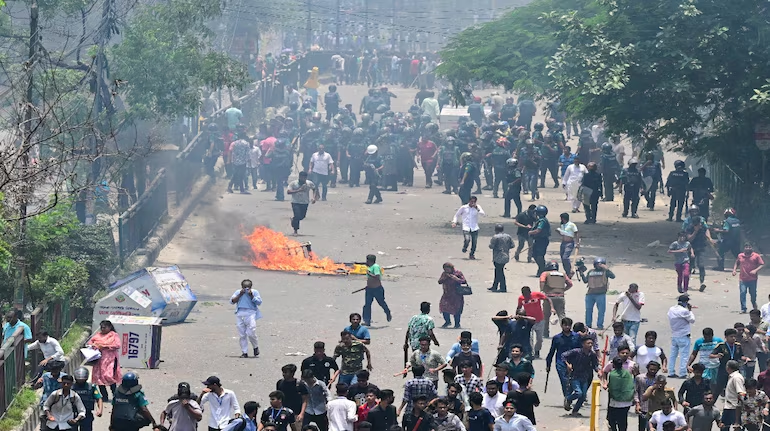Bangladesh Turmoil
Bangladeshi students set fire to the country’s state broadcaster on Thursday, following Prime Minister Sheikh Hasina’s televised appeal to calm escalating clashes that have claimed at least 32 lives.
Hundreds of protesters, demanding reform of civil service hiring rules, overwhelmed riot police who responded with rubber bullets.
The enraged crowd chased the retreating officers to BTV’s headquarters in Dhaka, setting ablaze the network’s reception building and several parked vehicles. According to the broadcaster, many people were trapped inside as the fire spread.
However, an official later confirmed that everyone had safely evacuated, although the fire continued, and broadcasting was halted.
In response to the deteriorating situation, Hasina’s government ordered the indefinite closure of schools and universities and increased police efforts to restore order.
In a broadcast on Wednesday night, Hasina condemned the “murder” of protesters and promised to punish those responsible, regardless of their political affiliations.
Law Minister Anisul Huq indicated the government’s willingness to negotiate with the protesters, although Hasina has yet to accept their demands.
Despite her call for calm, violence continued on the streets. Protester Bidisha Rimjhim, 18, stated that their primary demands include an apology from the prime minister and justice for the deceased protesters.
According to hospital tallies, at least 25 people died on Thursday, adding to the seven fatalities earlier in the week, with hundreds more injured.
Hospital officials reported that police weaponry caused most of these deaths and injuries, with rubber bullets and gunshots being the primary causes.
Journalist Didar Malekin from Dhaka Times confirmed the death of his reporter, Mehedi Hasan, during the clashes.
Riot police confronted protesters across several cities, with some of the fiercest clashes occurring at Canadian University in Dhaka, where 60 police officers were rescued from a rooftop by helicopter.
The protests, driven by opposition to a quota system in civil service appointments, have grown into broader discontent with Hasina’s rule, which critics describe as autocratic.
The government has faced accusations of capturing state institutions and suppressing dissent.
As a result, mobile internet outages and restricted access to Facebook, a key organizing tool for the protesters, were reported.
The Supreme Court is set to hear the government’s appeal against the reinstatement of the quota system on August 7.
Meanwhile, Amnesty International has condemned the Bangladeshi security forces for using unlawful force against the protesters.


